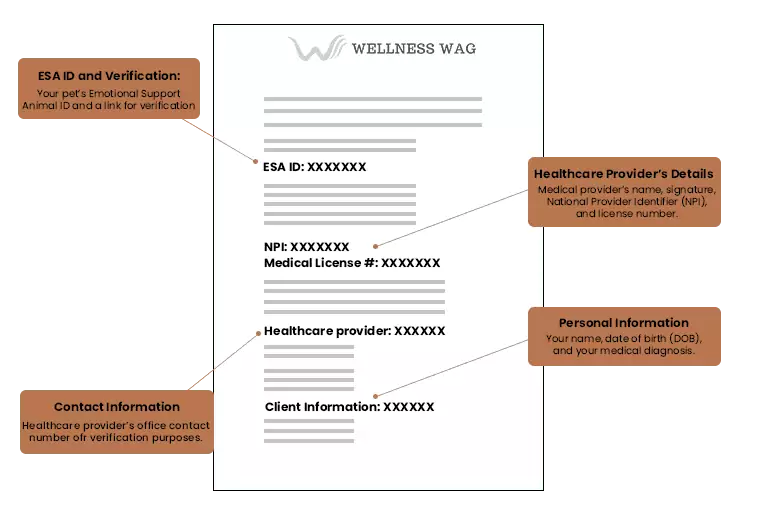Experience Our Quick and Easy Process
Experience Our Quick and Easy Process


Discover Your ESA Eligibility
Start Your Emotional Support Animal (ESA) registration by answering brief questions about your ESA requirements.

Consult with an experienced doctor
Consult a licensed medical professional for expert guidance and care.

Obtain your official esa letter
Get approved and receive your emotional support animal letter within 24 hours.
Your ESA Letter Contains the Following:
Money back Guarantee

If Your South Carolina ESA Letter is not approved, we will refund 100% of your payment.

See what our happy Pet parents have to say…
Meet Some of Our Compassionate Care Team

Dr. Chance Miller, MD
Dr. J. Chance Miller, a native of Alabama, earned his B.A. in Spanish with minors in Biology and Chemistry from the University of Alabama at Birmingham. He was the captain of his rugby team during his time there. Dr. Miller obtained his medical degree from Columbia University College of Physicians and Surgeons in New York City, and completed his internship and at Washington University in Saint Louis.

Dr. Tasha Kornegay
Dr. Tasha Holland-Kornegay is a Licensed Professional Counselor and pet expert. She began her journey as an Animal Assisted Therapist to help her patients manage tricky, chronic mental health concerns like anxiety and depression using animals. Her expertise extends beyond traditional therapy, as she incorporates a holistic approach that considers the unique bond between humans and animals.

Dr. Stephanie White
I’m Dr. Stephanie White, a Licensed Clinical Social Worker with advanced training in counseling since 2002. Offering Teletherapy, I guide you through challenges with evidence-based care. Licensed in multiple states, including CA, NV, AK, HI, FL, and TX, I aim to promote self-sufficiency and transform lives through growth. Start your journey to better mental health today!

Dr. Joel Durinka, M.D.
Dr. Joel B Durinka, MD, a renowned Family Medicine physician in Buffalo, NY, provides personalized healthcare. With extensive medical training, he ensures tailored care, prioritizing trust and open communication. Patients receive comprehensive care, and Dr. Durinka stays updated with medical advancements. He acknowledges the benefits of emotional support animals for patient well-being.
ESA Letter Walkthrough: Your Visual Guide to Comfort and Connection
About Emotional Support Animals In South Carolina


What is an emotional support animal in South Carolina?
In South Carolina, an emotional support animal (ESA) is a cherished companion animal that plays a crucial role in providing emotional comfort and support to individuals facing mental or emotional challenges. Unlike service animals, which undergo specialized training for specific tasks, ESAs in South Carolina offer therapeutic benefits through their calming presence and companionship. Licensed mental health professionals often prescribe ESAs as part of a holistic treatment plan.
Are emotional support animals considered service dogs in South Carolina?
No, South Carolina does not categorize emotional support animals (ESAs) in the same way as service animals. Service animals, such as guide dogs for the visually impaired or mobility assistance animals, receive specialized training to perform specific tasks aiding individuals with physical or mental disabilities. In contrast, ESAs provide emotional support and comfort without requiring specialized task-oriented training.
What is the difference between an emotional support animal and a service animal in South Carolina?
The primary difference between emotional support animals (ESAs) and service animals in South Carolina lies in their intended purpose and training. Service animals undergo intensive training to perform precise tasks directly aiding individuals with disabilities, such as guiding the visually impaired or alerting to seizures. On the other hand, ESAs in South Carolina do not require specialized training. Their primary role is to offer emotional support, alleviate symptoms of mental or emotional disabilities, and provide comfort to their owners. Licensed mental health professionals prescribe ESAs based on the therapeutic benefits they offer.

Discover Wellness Wag
We at Wellness Wag, comprise a team of devoted professionals who believe in enhancing lives through the healing power of emotional support animals. With our extensive experience in the sector, we’ve aided countless individuals in finding tranquility, comfort, and a revitalised sense of well-being through the companionship of an Emotional Support Animal.
Our objective at Wellness Wag is to ensure reliable and accessible Emotional Support Animal Letters consultations. This provides individuals battling emotional and mental health issues the chance to witness the life-changing impact of an ESA’s companionship. We are committed to equipping our clients with the knowledge and resources to navigate this process with confidence and empathy.
Discover The Effortless Way To Get Your Legitimate ESA Letter With Wellness Wag

Complete Our Assessment
Take our quick assessment to tell us about your situation and emotional support needs, so we can tailor our services to your emotional support animal in South Carolina.

Consult With Medical Physicians
After you submit the required forms, we’ll link you with a licensed medical professional in South Carolina for a personalized consultation and thorough evaluation to assess your eligibility for an ESA.

Receive Your ESA Letter
Upon confirmation by our team, you’ll receive a professionally crafted ESA letter with legal recognition within 24 hours of your consultation.
Wellness Wag offers a Money Back Guarantee to ensure a stress-free experience with your pet.
If, for any reason, your legitimate ESA letter doesn’t work, we will refund your money in full.
Whether it’s because of non-qualification or illegal denial by your landlord, we’ve got you covered.
Our policy guarantees a 100% refund for two reasons:
Embrace the transformative benefits of emotional support animals with ease.
Choose Wellness Wag for a smooth process guided by our trusted team of medical physicians.
Enjoy the positive impact of the ESA experience for you and your furry companions.



















